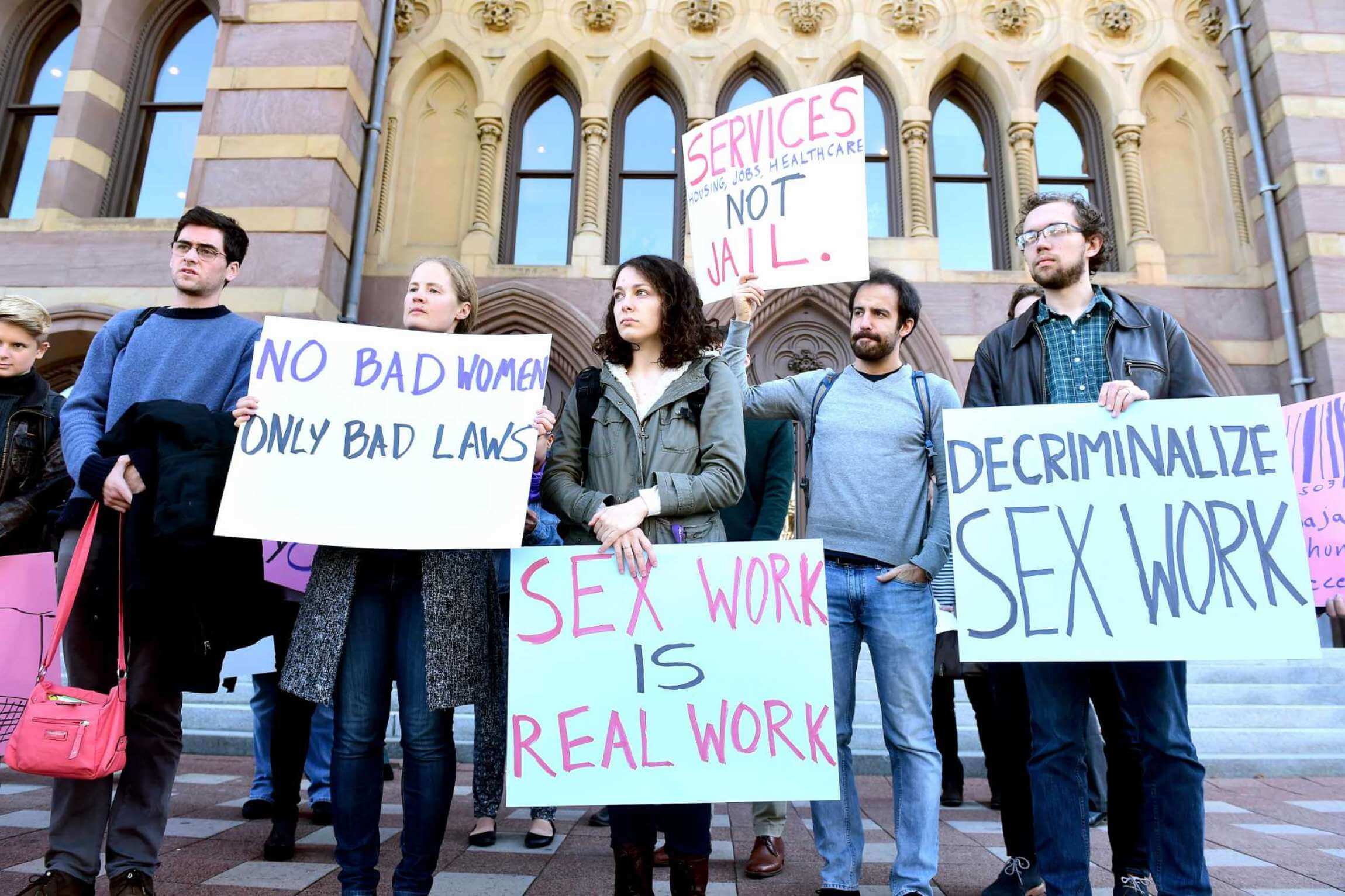What is sex work?
Sex work is the consensual exchange of sexual services between adults for money or something of value.
The forms of sex work are incredibly diverse. Sex work can include sex, pornography, erotic performances, online camming, fetish and domination work, sugar dating, and much more. Some people participate in sex work regularly, while some only work occasionally.
Why do people do sex work?
Most sex workers choose to do sex work because it is the best option they have to earn a livelihood and get the resources they need to survive.
Some sex workers struggle with poverty and have few other options for work. Others find that sex work offers better pay and more flexible working conditions than other jobs. And some pursue sex work to explore and express their sexuality.
People engage in sex work for many reasons that often fall along a spectrum of choice, circumstance, and coercion. Poverty and precarious circumstances often constrain livelihood decisions across a wide range of labor sectors (agriculture, food production, and care work, to name a few). Thus, policy and programming concerned with workers facing constrained decisions should seek to improve the entry, conditions, and exit capacity of workers across all sectors, without exceptionalizing the sex sector.
What is the difference between sex work and trafficking?
Trafficking refers to the intentional movement of someone through force, fraud, or coercion into any labor sector.
Human trafficking is an egregious human rights violation, while sex work is a consensual transaction between adults.
Conflating sex work with trafficking is dangerous.
Applying anti-trafficking laws to sex workers restricts rights and makes it harder to seek support and do outreach. Law enforcement raids drive sex work further underground and are not successful in identifying trafficking victims.
When sex workers can access authorities without fear of arrest, they can share information about potential trafficking situations and connect people who are being exploited to services.
The 2018 SESTA-FOSTA legislation shows exactly why it is dangerous to conflate trafficking with sex work. With the stated intention of fighting trafficking, the law criminalizes the operation of internet services that “promote or facilitate the prostitution of another person.”
The law resulted in the shutting down of countless advertisement services for sex workers, but it has almost never been used to prosecute actual traffickers. In fact, there is evidence that the law actually increased trafficking.
Service providers have reported that law enforcement has virtually stopped referring trafficking cases to shelters because their primary mechanism for identifying victims and perpetrators — online advertisements — has been removed.
SESTA/FOSTA has removed communication and safety networks for sex workers and other at-risk communities. When online options for finding and screening clients are removed, sex workers are pressured to take more risks. SESTA has forced sex workers to operate on the street, where clients are harder to find and impossible to screen, and predators posing as clients are more likely to take advantage.
How can I support sex workers?
- Educate yourself on sex work and the barriers sex workers face to health, safety, justice, and human rights. Learn about sex workers through their own voices.
- Support sex work decriminalization, the only legal model shown to increase safety and human rights for sex workers.
- Donate money and supplies to sex worker-led groups like SWAN, or your local group.
- Speak up when you hear sex workers disparaged in social or professional settings.
- If you are a service provider, evaluate whether your services are accessible to sex workers. Train your team on how to support sex workers without stigma or saviorism.
- Pay sex workers for their services. If you watch free porn, pay for a subscription service instead. If you go to a strip club, tip generously.
Why should I support sex work decriminalization?
By definition, sex work is consensual and nonviolent. Criminalizing sex work turns consenting adults into criminals. Sex work is not innately harmful, but by criminalizing it and enforcing a stigma around it, societies make sex work circumstantially harmful and deny workers access to their human rights and workplace health and safety.
When sex work is criminalized, sex workers routinely face abuse and exploitation from law enforcement. Sex workers cannot seek justice for sexual assaults or robberies that occur on the job without risking arrest or harrassment from the police. Additionally, the stigma placed on sex work through its criminalization places incredible barriers on sex workers for receiving employment, housing, and medical services.
“Many anti-prostitution activists conflate sex work with trafficking and argue that all sex workers are victims. Decriminalizing sex work affirms that there is a distinction between consenting adults trading money for sex and abused sex trafficking victims being forced or coerced to have sex against their will. This distinction shows legal respect for a woman’s autonomy and a woman’s choice about what to do with her own body. Lumping sex workers in with victims of sexual abuse belittles women’s agency and their ability to make their own choices.” – Leigh Cuen, Mic
Organizations that support the decriminalization of sex work include the American Civil Liberties Union (ACLU), Amnesty International, the World Health Organization (WHO), and the Human Rights Watch.
Scroll down to read more about why SWAN advocates for the decriminalization of sex work, and to access resources laying out the evidence to support sex work decrim.
Why is SWAN against the End Demand / Nordic model?
Also known as the Swedish, Nordic Model, End Demand legislation penalizes clients who pay for sex.
This model is framed as a strategy to end sex work without punishing sex workers, who are seen as victims. The reality is that women are made more vulnerable to violence, discrimination and exploitation.
Many studies have analyzed the impacts of End Demand legislation in countries where it has been implemented, including Sweden, South Africa, Northern Ireland, France, Canada, Iceland, Norway, and Israel. None of those countries report any improvement in the lives of sex workers as a result of the legislation.
Criminalization of clients disrupts the ways in which workers were able to find and talk to clients. Workers report having to rush negotiations, meaning less time to declare boundaries and assess whether a client was dangerous. When sex workers report violence to the police, they often face increased police surveillance of their clients, resulting in a loss of livelihood. In countries where End Demand legislation has been implemented, sex workers and service agencies report increased in violence.
End Demand legislation also has a negative impact upon the identification of victims of trafficking. Clients and sex workers are well placed to report exploitation. An organization in South Africa reported: “We have cases where clients want to come forward and report human rights violations and can’t because they’re criminalized.”
SWAN believes that sex workers deserve the agency to set the conditions of their work, and that we must resist all policies that prevent sex workers from fighting violence.
Why we advocate for full decriminalization of sex work
SWAN advocates for the full decriminalization of sex work. Decriminalization removes penalties for sex workers, buyers, and those who work in supporting sex workers’ labor. Without criminal penalties, sex workers have better access to health and legal services, more control over their work, and greater ability to seek protection or redress in the face of violence or other harms. Trafficking, violence and victimization, intimate partner violence, and commercial sex acts involving minors all remain illegal under this model.
Reasons to decriminalize sex work:
Safety: Criminalization forces workers to compromise on some or all of their safety strategies in order to avoid police.
Economic hardship: Criminal records make it harder for sex workers to find alternative employment, holding them in street economies and economic hardship.
Health: Stigma and discrimination make it harder for sex workers to access essential health care and mental health services.
STI Transmission: The threat of arrest reduces sex workers’ ability to negotiate with clients about condom use. According to the ACLU, decriminalization could prevent 33 to 46 percent of HIV transmissions among female sex workers.
Social justice: Sex workers from marginalized populations experience higher levels of violence and are more likely to work on the streets.
Basic rights: Criminalization makes it difficult for sex workers to open bank accounts, vote, serve on juries, qualify for financial aid or college admission, or get professional licenses.
Fighting trafficking: Evidence shows that decriminalization is part of an effective set of anti-sex trafficking interventions. When sex workers are not threatened with criminal charges, they are better able to identify and report cases of trafficking, violence, and abuse to authorities.
“Criminalization does not prevent commercial sex. It does not deal with the root causes of why people sell sex - which is to get the resources they need.”
Juno Mac and Molly SmithRevolting Prostitutes: The Fight for Sex Workers' Rights


